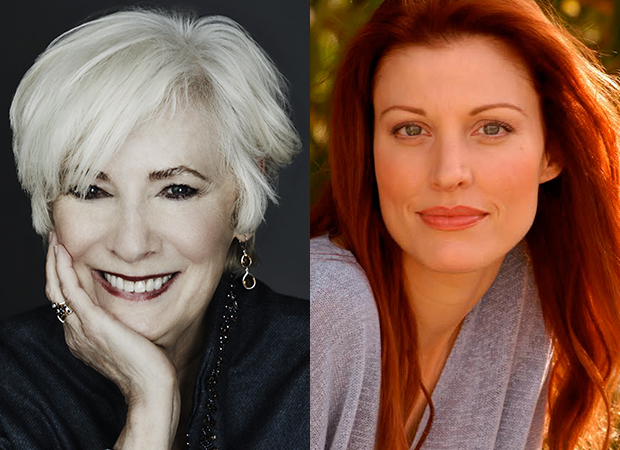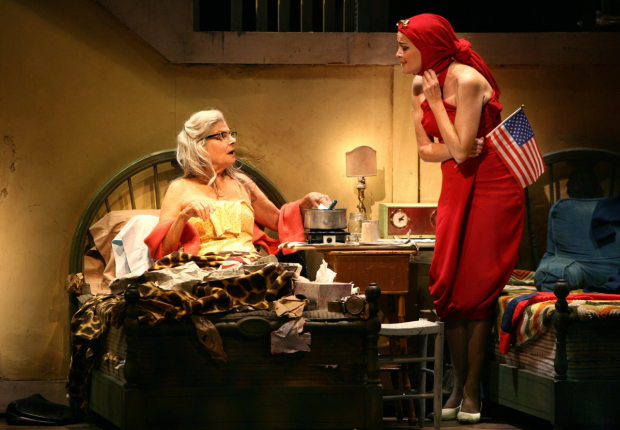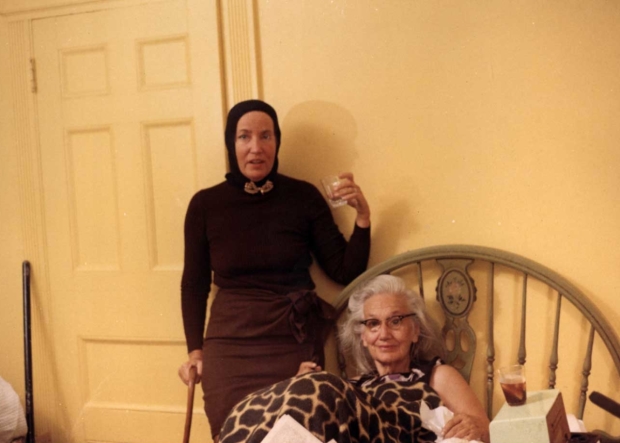Betty Buckley and Rachel York Are Entering Grey Gardens
A pair of Broadway darlings takes on two iconic roles in Bay Street Theater’s production of the 2006 musical.
"I'm so charmed by these two women," Betty Buckley says. "Many people view them as just two crazy ladies, but they were two women who took a stand in a time period [when] their dreams and essential aspirations were so thwarted." Buckley, a Tony winner for Cats and one of the bona-fide legends of the theater world, is talking about the real-life mother-daughter duo Edith Ewing Bouvier Beale and Edith Bouvier Beale, a twosome best known by the sobriquets Big Edie and Little Edie, whose lives were immortalized onscreen in Albert and David Maysles' 1975 documentary Grey Gardens.
The Beales, aunt and first cousin of Jacqueline Kennedy Onassis, famously lived in squalor and isolation at their East Hampton estate. Thirty years after the brothers Maysles released their film, the larger-than-life figures had their story brought to the stage in a musical version of Grey Gardens, written by Scott Frankel, Michael Korie, and Doug Wright. And now, nine years after Christine Ebersole and Mary Louise Wilson made indelible, Tony-winning marks on the show, first at Playwrights Horizons and then Broadway's Walter Kerr Theatre, it's Buckley's turn to breathe new life into the story of the Beales, joined by Drama Desk Award winner Rachel York at the Bay Street Theater in Sag Harbor, just eight miles from the actual estate, August 4-30.
Peas in a Pod

Buckley was first to be cast, a process that was as easy as answering the phone. "[Director Michael Wilson] called me and asked me to play Big Edie and I was thrilled," she recalls. He then suggested York. "I've been a fan [of her] since Victor/Victoria and I think Rachel, of her generation of leading lady-actress-singers, is one of the greats. There are not that many singing actresses who have her chops. I wanted to have a teammate that I really admired, and [I knew] that we would feel safe with each other."
York turned down a different project, one "that even paid more money and was less work," for this "once in a lifetime" engagement. "I couldn't pass up the opportunity to work with Betty and delve into these eccentric characters. I've got my work cut out for me."
The House We Live In

(© Joan Marcus)
Neither Buckley nor York (who didn't even see the original production) is worried about competing with the memories of the original. "Christine Ebersole was really quite beautiful in it, and Mary Louise Wilson is one of our great actresses," Buckley says. "They did a wonderful job. Rachel and I are going to bring different values to it."
In all their research, which includes watching the film and reading several books on the subject, one thing stumps them: How could a family with such stature could just give up on the Edies, essentially turning their backs on them? "What I really need to understand," Buckley states, "is how this family could so thoroughly abandon them. Where were the two sons? Why were the renovations [which were provided in 1972 by Jackie O. and her sister, Lee Radizwell] so poorly done? It could have been handled so easily by such a wealthy family. They could have gotten the help that they needed." "Big Edie was so beloved by so many, and she was bedridden," York continues. "You would think that they would have wanted to take care of her."
Unlike the documentary, which follows Big and Little Edie's lives in the 1970s, the musical imagines what their heyday looked like, as well. The first act, dominated by York as a young version of mama Edith, takes place in 1941. In the second half, 32 years have gone by and York becomes Little Edie, while Buckley plays the bed-ridden, cat-food-eating Big Edie.
The prospect of playing actual people is overwhelming for both. "I am a bit daunted about playing a real person," Buckley says. "I've never played a real person before." York is placing emphasis on accuracy. "I'm trying to find the layers and be as truthful as possible. Obviously, they had wonderful qualities and many flaws, as well." Buckley continues, "The inertia about their environment is shocking, but endearing in so many other ways. They lived with great humor and incredible love for one another, with real devotion, and I just hope we can get the essence of that in our production. That's what's been so moving to me about the documentary."
"Time Rushes By, Memories Fade, Dreams Never Do…"

(© Janus Films)
Both performers believe that this production will provide them with the opportunity to utilize the skills that they've long cultivated but only rarely get to use. Buckley comments on the subject of stereotyping in show business:
"Sometimes people think very categorically and can view actresses stereotypically. Pigeonholing is prevalent," Buckley notes. "I know it's happened in my career. Some people think an actress is the same person as the character she plays. For example, Rachel is such a great beauty…so I think some people look at our more beautiful actor/singers and say, 'Oh, that's what they do,' as opposed to 'They can do all of this too.' I don't think some people in our business have the creative imagination to realize that actresses who have trained and been around a while might also have the range to play many different kinds of characters." "It's troubling," York succinctly interjects.
But York is relishing the opportunity to do this show, with Buckley onstage next to her. "I'm the luckiest person in the world," York adds happily. "I'm incredibly excited to be working with Betty. It's been a long time in coming."
"After this," Buckley concludes with a laugh, "People are gonna think Rachel and I are two weirdos. We gotta get ready, Rachel!"










